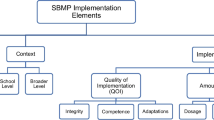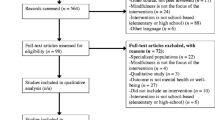Abstract
This study examined the cost of implementing the Cultivating Awareness and Resilience in Education (CARE) for Teachers professional development program during a randomized controlled trial targeting a diverse sample of public elementary school teachers in New York City. Detailed budget information collected during the study was used to identify the cost of all necessary resources associated with program implementation. The largest expense category was opportunity costs associated with teacher participation, accounting for over 40% of the total cost. This was closely followed by the program-required costs related to coordination, facilitation, and supplies for the program (31.8%). Finally, ancillary costs related to facilitator travel, room rental, and food for the program implementations encompassed 11% of the total cost. Across all three program implementations, 118 teachers were trained; the average cost per teacher was US$1217 when accounting for all categories. In future cost projections for a training with 30 teachers, the price per teacher is only US$515 when considering program-required and indirect costs. The costs for implementing the CARE for Teachers program are similar to those reported for other mindfulness-based interventions (MBIs). This paper provides a detailed analysis of the full cost of providing an evidence-based MBI to teachers in a public education setting. This research can help inform communities interested in funding future CARE for Teachers program implementations, provide an example for cost reporting for other MBIs, and provide a basis for future cost-effectiveness and benefit-cost analyses.
Similar content being viewed by others
References
Belfield, C., Bowden, B., Klapp, A., Levin, H., Shand, R., & Zander, S. (2015). Economic value of social and emotional learning. Journal of Benefit-Cost Analysis, 6(3), 508–544. https://doi.org/10.1017/bca.2015.55.
Brown, J. L., Jennings, P. A., Cham, H., Rasheed, D., Frank, J. L., Doyle, S. L., … Greenberg, M. T. (2017). CARE for Teachers: direct and mediated effects of a mindfulness-based professional development program for teachers on teachers’ and students’ social and emotional competencies. In (J. Downer, Chair) Social and emotional learning in educational settings invited symposium: Role of teacher well-being & stress in the classroom. Paper presented at the Society for Research on Educational Effectiveness (SREE) Annual Conference, Washington, D.C. (March).
Calculating the Costs of Child Welfare Services Workgroup. (2013). Cost analysis in program evaluation: a guide for child welfare researchers and service providers. Washington, D.C. Children’s Bureau, Administration for Children and Families, U.S. Department of Health and Human Services. Retrieved from https://www.acf.hhs.gov/sites/default/files/cb/cost_analysis_guide.pdf
Charles, J. M., Edwards, R. T., Bywater, T., & Hutchings, J. (2013). Micro-costing in public health economics: steps towards a standardized framework, using the incredible years toddler parenting program as a worked example. Prevention Science, 14(4), 377–389. https://doi.org/10.1007/s11121-012-0302-5.
Edwards, R. T., Bryning, L., & Crane, R. (2015). Design of economic evaluations of mindfulness-based interventions: ten methodological questions of which to be mindful. Mindfulness, 6(3), 490–500. https://doi.org/10.1007/s12671-014-0282-6.
Greenberg, M. T., Brown, J. L., &Abenavoli, R. M. (2016).Teacher stress and health: effects on teachers, students, and schools. Policy brief for the Social-Emotional Learning Policy Brief Project funded by the Robert Wood John Foundation. University Park: Edna Bennett Pierce Prevention Research Center, The Pennsylvania State University. Retrieved fromhttp://www.rwjf.org/en/library/research/2016/07/teacher-stress-and-health.html
Jennings, P. A. (2015). Mindfulness for teachers: simple skills for peace and productivity in the classroom. New York: W.W. Norton & Company.
Jennings, P. A., Snowberg, K. E., Coccia, M. A., & Greenberg, M. T. (2011). Improving classroom learning environments by cultivating awareness and resilience in education (CARE): Results of two pilot studies. The Journal of Classroom Interaction, 46(1), 37–48 Retrieved fromhttp://www.jstor.org/stable/23870550.
Jennings, P. A., Frank, J. L., Snowberg, K. E., Coccia, M. A., & Greenberg, M. T. (2013). Improving classroom learning environments by Cultivating Awareness and Resilience in Education (CARE): results of a randomized controlled trial. School Psychology Quarterly, 28(4), 374–390. https://doi.org/10.1037/spq0000035.
Jennings, P. A., Turksma, C., & Brown, R. (2016). Cultivating Awareness and Resilience in Education (CARE for Teachers) Professional Development Program Manual. Garrison: Garrison Institute.
Jennings, P. A., Brown, J. L., Frank, J. L., Doyle, S., Oh, Y., Davis, R., …Greenberg, M. T. (2017). Impacts of the CARE for teachers program on teachers’ social and emotional competence and classroom interactions. Journal of Educational Psychology,109(7), 1–19. doi:https://doi.org/10.1037/edu0000187.
Kuyken, W., Hayes, R., Barrett, B., Byng, R., Dalgleish, T., Kessler, D., et al. (2015). Effectiveness and cost-effectiveness of mindfulness-based cognitive therapy compared with maintenance antidepressant treatment in the prevention of depressive relapse or recurrence (PREVENT): a randomised controlled trial. The Lancet, 386(9988), 63–73. https://doi.org/10.1016/S0140-6736(14)62222-4.
Lengacher, C. A., Kip, K. E., Reich, R. R., Craig, B. M., Mogos, M., Ramesar, S., … Pracht, E. (2015). A cost-effective mindfulness stress reduction program: a randomized control trial for breast cancer survivors. Nursing Economic$, 33(4), 210–218,232.
Levin, H. M. (1983). Cost effectiveness: a primer (Vol. 4). Beverly Hills: Sage Press.
Long, K., Brown, J. L., Jones, S. M., Aber, J. L., & Yates, B. T. (2015). Cost analysis of a school-based social and emotional learning and literacy intervention. Journal of Benefit-Cost Analysis, 6(3), 545–571. https://doi.org/10.1017/bca.2015.6.
National Education Association. (2013). 2012–2013 Average Starting Teacher Salaries by State. Retrieved from http://www.nea.org/home/2012-2013-average-starting-teacher-salary.html
Rice, J. K. (1997). Cost analysis in education: paradox and possibility. Educational Evaluation and Policy Analysis, 19(4), 309–317. https://doi.org/10.3102/01623737019004309.
Singh, N. N., Lancioni, G. E., Adkins, A. D., & Singh, J. (2008). Clinical and benefit–cost with intellectual disabilities. Behavior Modification, 32(5), 622–637. https://doi.org/10.1177/0145445508315854.
Singh, N. N., Lancioni, G. E., Karazsia, B. T., Myers, R. E., Winton, A. S. W., Latham, L. L., & Nugent, K. (2015). Effects of training staff in MBPBS on the use of physical restraints, staff stress and turnover, staff and peer injuries, and cost effectiveness in developmental disabilities. Mindfulness, 6(4), 926–937. https://doi.org/10.1007/s12671-014-0369-0.
Singh, N. N., Lancioni, G. E., Karazsia, B. T., Chan, J., & Winton, A. S. W. (2016a). Effectiveness of caregiver training in mindfulness-based positive behavior support (MBPBS) vs. training-as-usual (TAU): a randomized controlled trial. Frontiers in Psychology, 7(Oct), 1–13. https://doi.org/10.3389/fpsyg.2016.01549.
Singh, N. N., Lancioni, G. E., Karazsia, B. T., & Myers, R. E. (2016b). Caregiver training in mindfulness-based positive behavior supports (MBPBS): effects on caregivers and adults with intellectual and developmental disabilities. Frontiers in Psychology, 7(Feb), 1–11. https://doi.org/10.3389/fpsyg.2016.00098.
Singh, N. N., Lancioni, G. E., Medvedev, O. N., Myers, R. E., Chan, J., McPherson, C. L., … Kim, E. (2018). Comparative effectiveness of caregiver training in mindfulness-based positive behavior support (MBPBS) and positive behavior support (PBS) in a randomized controlled trial. Mindfulness. doi:https://doi.org/10.1007/s12671-018-0895-2.
U.S. General Services Administration. (2017). Fiscal Year2017. Per Diem Rates. Retrieved from https://www.gsa.gov/travel/plan-book/per-diem-rates/per-diem-files-archived
van Ravesteijn, H., Grutters, J., olde Hartman, T., Lucassen, P., Bor, H., van Weel, C., … Speckens, A. (2013). Mindfulness-based cognitive therapy for patients with medically unexplained symptoms: A cost-effectiveness study. Journal of Psychosomatic Research, 74(3), 197–205. doi:https://doi.org/10.1016/j.jpsychores.2013.01.001.
Acknowledgements
We would like to thank the teachers and administration in the New York City schools and the NYC Department of Education. Without your participation and support, this work is not possible.
Funding
The project described was supported by the Grant Award R305A120180 from the Institute of Educational Sciences (IES). The content is solely the responsibility of the authors and does not necessarily represent the official views of the Institute of Educational Sciences or the US Department of Education.
Author information
Authors and Affiliations
Contributions
SLD: designed and executed current study, collected and analyzed data, and was the primary author of the paper. JLB: collaborated on the design and execution of the current study, assisted with writing and editing of paper, and designed and executed parent study. DR: assisted with data collection and study design and assisted with writing and editing of paper. DJ: collaborated on the design and writing of the current study and assisted with editing of the paper. PAJ: assisted with design and execution of current study, assisted with editing of the paper, and designed and executed parent study.
Corresponding author
Ethics declarations
Ethical Approval
All procedures performed involving human participants were in accordance with the ethical standards of the Pennsylvania State University, University of Virginia, and the New York City Department of Education Internal Review Boards, and with the 1964 Helsinki declaration and its later amendments or comparable ethical standards.
Informed Consent
Informed consent was obtained from all participants in the study.
Conflict of Interest
The authors declare that they have no conflict of interest.
Rights and permissions
About this article
Cite this article
Doyle, S.L., Brown, J.L., Rasheed, D. et al. Cost Analysis of Ingredients for Successful Implementation of a Mindfulness-Based Professional Development Program for Teachers. Mindfulness 10, 122–130 (2019). https://doi.org/10.1007/s12671-018-0958-4
Published:
Issue Date:
DOI: https://doi.org/10.1007/s12671-018-0958-4




